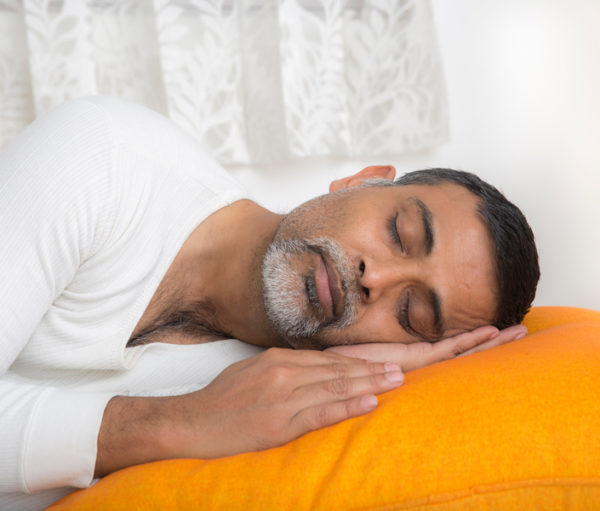March Is National Sleep Awareness Month

Some people seem proud that they get by with little sleep. They speak of sleep as if it were just a waste of time. But research confirms that sleep is vital for good health. It protects our memory, reduces our pain level, helps us maintain a healthy weight, and helps us avoid or manage health conditions, from diabetes to heart disease to depression.
Fortunately, researchers today have sophisticated technologies at their disposal with which to learn more about that one-third of our lives, during which we might appear to be doing nothing—but in fact, during which our brains are doing quite a lot! Here are some of the things neurologists have discovered.
While we slumber, our brains aren’t slacking. It is during sleep that our brains consolidate memories. A good night’s sleep is a better way to perform well on a test than cramming all night, experts say. As we’re sleeping, our brains are also deciding which memories to keep, and which ones to discard. And now we know that sleep is the time when the brain’s own cleaning system is hard at work. Scientists found that only while we’re sleeping can our brains remove waste. Why? University of Copenhagen expert Dr. Maiken Nedergaard used this analogy: “There is probably a good reason why we do not clean the brain while awake—how could the nerve cells work in a dishwasher?”
New understanding of the relationship between sleep problems and dementia. A study from University of California, Berkeley found that changes in the brain caused by dementia can have a negative effect on our sleep, and might even be considered a diagnostic tool. And the opposite is true, they found: People whose sleep quality declined between their 50s and 60s had a greater risk of later developing Alzheimer’s disease. The researchers urge people to seek treatment right away for sleep disorders, and to practice good sleep habits—getting enough sleep, creating a quiet, dark sleep environment, and avoiding staring into the light of our smartphones in the evening, for example.
Sleep apnea is more common than once thought. Research from University of Michigan Medicine found that 56% of people older than 65 are dealing with sleep apnea, defined as “a sleep disorder in which the throat collapses during sleep, causing the patient to repeatedly stop breathing for periods of 10 seconds or longer throughout the night.” Yet only 8% of these seniors have ever been evaluated or treated for the condition. Sleep apnea can come with a hefty price tag. University of Maryland School of Medicine researchers report that among seniors diagnosed with sleep apnea, those who are treated for the condition have on average $20,000 lower Medicare costs than those who are not treated.
Sleep problems can be bad for your marriage. A study from the Ohio State University Wexner Medical Center revealed that when spouses don’t get a good night’s sleep, they are liable to have more arguments, and to be more hostile to one another during those tiffs. The team says sometimes this is because one partner is having trouble sleeping, and keeps the other one awake. “Part of the issue in a marriage is that sleep patterns often track together. If one person is restless, or has chronic problems, that can impact the other’s sleep. If these problems persist over time, you can get this nasty reverberation within the couple,” noted study author Janice Kiecolt-Glaser. When you get help for snoring, sleep apnea or other sleep problems, you’re doing it for your partner, as well.
Do you need a sleeping pill, or a walk in the park? A University of Illinois study found that seniors who have access to nature report better quality sleep. In part, the experts speculate, this is because we tend to get more physical activity when we’re in natural surroundings. But that doesn’t explain the entire effect. The team thinks spending time in nature helps regulate our circadian rhythm, also known as our sleep/wake cycle—the internal clock that urges our bodies to shut down for the night and come back to alertness in the morning. Said study author Prof. Diana Grigsby-Toussaint, who is now at Brown University, “If there is a way for persons over 65 to spend time in nature, it would improve the quality of their sleep—and their quality of life—if they did so.”
The complicated relationship between coffee and sleep. We’ve long known that coffee can perk us up in the morning—but, if we have that cup of joe in the evening, we’re liable to toss and turn. A research team from University of Colorado Boulder explains that the caffeine in coffee, which the study authors call “the most widely used psychoactive drug in the world,” affects the hormones that regulate our circadian rhythms, causing a delay in the time our bodies power down in response to nighttime by about 40 minutes. The effect even shows up in primitive creatures like algae and fruit flies, they report.
Studies continue to confirm that while older adults may have trouble getting to sleep and falling asleep, this isn’t “just a part of getting older.” Our sleep patterns often do change as we grow older—for example, we tend to go to sleep earlier and then wake up earlier in the morning. But more troublesome sleep problems might be caused by pain, anxiety, the medications we take, and inactivity. Ask your doctor for an evaluation. Sleep specialists offer many therapies to improve our sleep.
The information in this article is not intended to replace the advice of your health care provider. Report sleep problems to your doctor.
Source: IlluminAge


